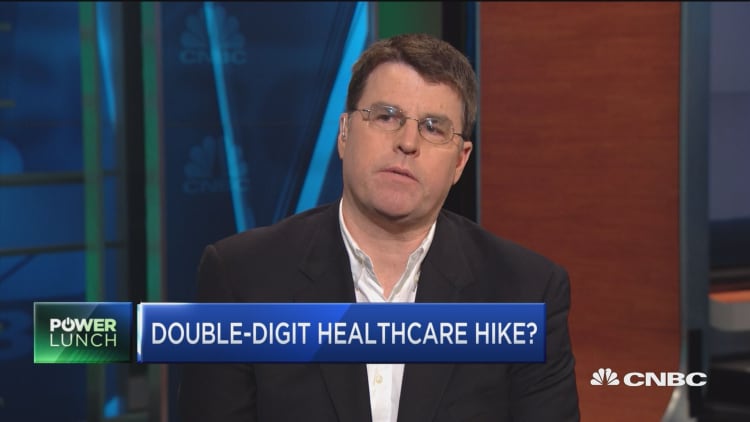Denial ain't just a river in Egypt — and it could cost your company $6 million in penalties.
Employers are scrambling to meet a June 30 deadline to file, for the first time, Obamacare forms with the IRS that show whether they offered and provided health insurance to workers.
Employers with 50 or more full-time workers have known, or should have, for years about the requirement. The deadline was extended months ago.
Failure to furnish the IRS forms to workers can lead to fines for employers of $250 per worker — up to a maximum of $3 million. Failure to transmit the forms and others to the IRS carry the same penalties, for a total potential penalty of $6 million.
But none of that means every employer will meet the deadline.
At many companies, "they're freaking out," said Todd Praisner, CEO of Tango Health, an Obamacare compliance assistance firm that is helping employers with a cumulative 2.5 million workers handle the forms.
Tango Health has been getting calls daily from employers saying "they've got a problem," Praisner said.
The calls don't surprise Praisner, who knew that some employers had already missed an earlier important deadline for furnishing required Obamacare forms to workers.
"We still expect a lot of businesses are behind the curve on this," said Nicole Elliott, former IRS senior adviser for the Affordable Care Act, and now partner in the Holland & Knight law firm.
She said she expects that a significant percentage of employers will miss the deadline.
Obamacare requires large employers to offer workers health coverage or face a potential penalty of thousands of dollars per worker. After some delays, that so-called employer mandate as of 2015 applied to employers with 100 or more full-time workers. As of this year, it applies to employers with 50 or more full-time workers.
To make sure that employers are complying, the law requires, starting this year, that all large employers give workers an IRS 1095-C form for their tax records. The forms show whether the employee in the prior year was offered health insurance, and whether they and their family members were enrolled.
Employers then must file a 1094-C form, which summarizes broad information about employers' insurance offer, the number of full-time workers they have, and other data. Employers must also file copies of the 1095-C forms they gave workers.

Delays in implementing the employer mandate created the impression in some executives' minds that the mandate — and the form-filing requirements — would end up being delayed yet again, killed by a Republican-controlled Congress, or somehow stopped by a Supreme Court challenge. None of those things happened.
"I think there was a certain amount of denial going on," Elliott said.
Elliott, who left the IRS only three months ago, was in meetings with employers last year, when they expressed concern about their readiness to meet the form-related deadlines.
Some companies were already assembling their required data, but "you had some ones that called and said, 'Hey, what is this thing we are required to do?'" Elliott recalled.
Their concerns led to the Obama administration's decision to delay by two months, until March 31, the deadline for employees to furnish 1095-C forms to workers. The administration also delayed by three months, until June 30, the deadline for employees to transmit 1094-C and 1095-C forms to the IRS.
Elliott said the concerns were warranted, because the requirement is new for employers this year, and because the information they have to collect first "is much more involved" than just pulling workers' names and Social Security numbers.
Praisner detailed how complicated that process can be.
For most of the business world, "full time" means employees who put in 40 or more hours per week. But Obamacare considers any worker who puts in 30 hours or more on average over the course of the year to be full time, Praisner noted.
Making such calculations can be trickier. That's because time off by workers for family medical leave, military service or jury duty does not count against the employee when their average work hours are figured out.
Praisner said half the companies that Tango Health is dealing with have no leave-tracking in place.
Even when employers think they are correctly tracking hours, there can be problems.
One prestigious university told Tango Health "we're going to have the best data you've ever seen," according to Praisner. But when Tango looked at the data, it found issues that included records showing an employee had worked hours "before their start date," he said. "And somebody who had hours worked after their end date."
But the biggest problem was the tally of the number of student employees who worked at the university. Those student workers had to be offered health coverage.
"They thought they had maybe 400 of them. Turns out that they had 5,000 in that category," Praisner said.
For companies trying to assemble and file their own data, there's another issue.
The IRS has created a new electronic transmittal system for employers to send in their Obamacare-related forms. That system requires employers or the third-party firms that will be transmitting the forms for them to get a certification from the IRS and a special transmitter code.
Praisner said the system requires an "unbelievably complicated" computer language used to describe the data in the forms.
"People are calling saying, 'I can't figure out how to submit to the IRS,'" Praisner said.






